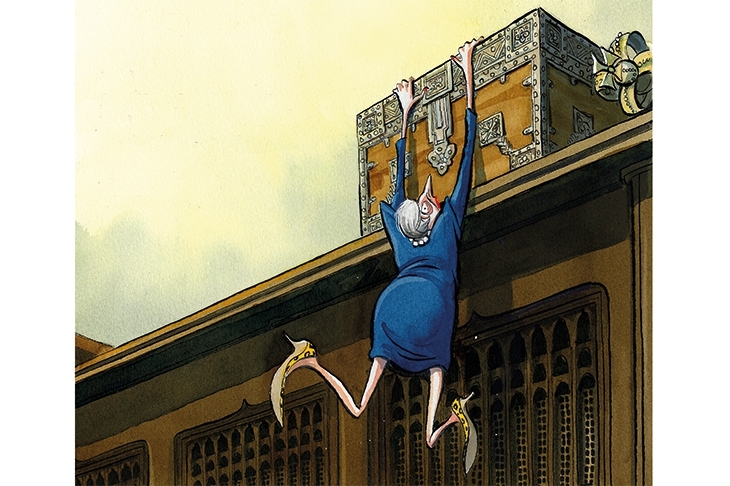When Theresa May told a joke at her own expense at a reception of Tory MPs held to celebrate Boris Johnson’s landslide election victory in December 2019, the assembled audience breathed a sigh of relief.
Many had expected the freshly re-elected May to be a thorn in the side of her successor during the ensuing parliamentary term. But her deferential joke, about her own botched 2017 election campaign, seemed to amount to an acknowledgment of the superior appeal of Boris Johnson.
In fact, the pessimists were right first time, and this has been underlined by May’s extraordinary speech about Afghanistan in the Commons this week.
Almost everything she said appeared designed to cast the Prime Minister in a negative light. She reminded MPs that Johnson had said in July that he did not think the Taliban would be able to take control of the country, before adding icily:
‘Was our intelligence really so poor? Was our understanding of the Afghan government so weak? Was our knowledge of the position on the ground so inadequate? Did we really believe that, or did we just feel that we had to follow the United States and hope that, on a wing and a prayer, it would be all right on the night?’
In fact, it is May who should have been feeling sheepish during the Afghanistan debate
As most of the assembled MPs will have realised, ‘our’ and ‘we’ meant Boris Johnson. Phrases such as ‘a wing and a prayer’ and ‘all right on the night’ played into the view of him as a bluffer and a seat-of-his-pants spiv – the kind of person who would not even bother to read his intelligence briefings.
And when John Redwood asked her, not unreasonably, to agree that President Biden deciding unilaterally to withdraw was at the heart of the mess, she wouldn’t even concede that, instead replying: ‘It was a unilateral decision of President Trump to do a deal with the Taliban that led to this withdrawal.’
Even more ludicrously, May implied it should have been a piece of cake for Britain to put together a new international alliance in the absence of the US to ward off the Taliban.
‘I find it incomprehensible and worrying that the United Kingdom was not able to bring together… an alternative alliance of countries to continue to provide the support necessary to sustain a government in Afghanistan,’ she told MPs.
Defence Secretary Ben Wallace, who worked very hard to do just that, is surely entitled to feel particularly aggrieved at such an uncharitable take. Who these partners, willing and able to commit fresh resources into Afghanistan, might be, Theresa May neglected to say. As the old joke puts it, with friends like that, who needs enemies?
In fact, it is May who should have been feeling sheepish. In January she penned a newspaper article following President Biden’s inauguration heralding him and Vice President Kamala Harris as ‘partners for positive action to make our world a safer place’. It hasn’t quite turned out like that, has it?
In that article for the Daily Mail, May also sought to draw a parallel between the disgraced Trump and Johnson, who she criticised for ‘threatening to break international law by going back on a treaty we had just signed’. She also said that Johnson cutting the foreign aid budget had harmed Britain’s ‘credibility in the eyes of the world’.
Since then, she has attacked Boris Johnson in the Commons on Brexit and the aid budget and in June threw in for good measure a strongly-worded assault on the government’s Covid travel restrictions, claiming: ‘It is incomprehensible I think that one of the most heavily vaccinated countries in the world is the one that is most reluctant to give its citizens the freedoms those vaccinations should support.’
Theresa May has been fairly widely praised for her decision to stay in the Commons following her unhappy eviction from Downing Street. For a while it seemed as if she would seek out and find a distinctive and constructive role for herself. The contrast with the money-grubbing antics of David Cameron should have worked in her favour.
Yet now she is in severe danger of re-enacting the embittered behaviour of another short-lived and establishment-minded premier succeeded by a much better communicator. I refer, of course, to Edward Heath and his ‘incredible sulk’ towards Margaret Thatcher.
Heath kept that up for nearly 16 years – from his ousting in 1975 to her downfall as PM in November 1990 – once joking that news of Thatcher being deposed had caused him to say ‘rejoice’ three times.
Theresa May only started cutting up rough a year or so ago. But whereas Heath’s war on Thatcher mainly consisted of glowering, May’s vendetta can be measured in parliamentary speeches. She certainly will not struggle, from now on, to draw a crowd to the Commons chamber. That, alas, was not always the case when she was in high office.







Comments